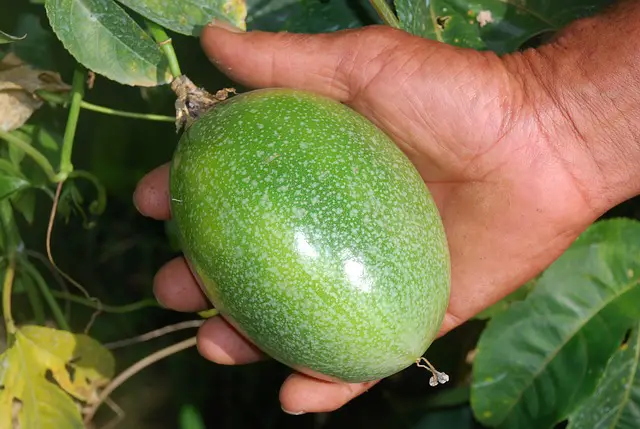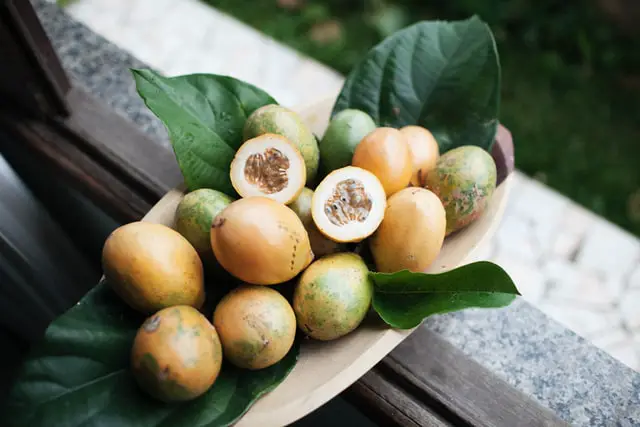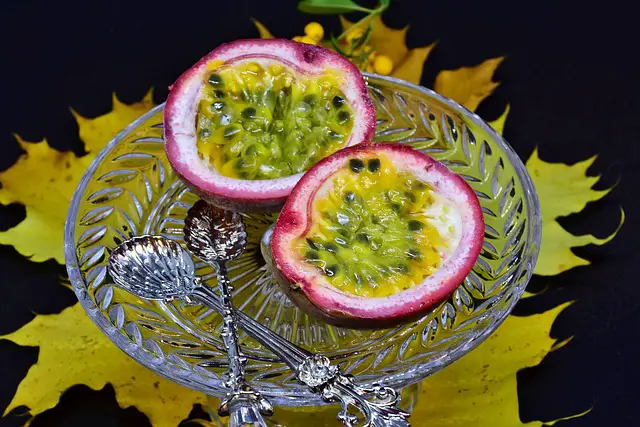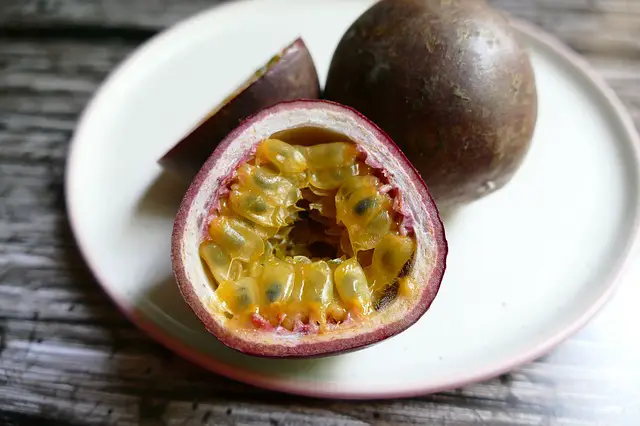Passion fruit is among the most beloved and popular exotic fruits in many American households
When I was introduced to passion fruits for the first time, their unique purple and yellow colors and their fruity tartaric aroma were the main features that made me love them to this day.
Most people, including me, are curious about the origin of this fruit’s taste and smell, which are genuinely perplexing since the fruit tends to exhibit a contrasting bitter-sweet taste that makes it difficult for fruit lovers to explain.
So, to answer the main question of this article, I will use a combination of my passion fruit enthusiasm and my food science background to try and explain where the tart taste in the fruit comes from.
Simply put, passion fruit’s unique tart taste and smell come from its composition of organic acids, esters, alcohol, terpenes, and other aromatic compounds within the fruit’s pulp and seeds.
If you want to know more about this exotic fruit, this article will explain a few things about passion fruits. You will learn about its taste and smell, its varieties, its health benefits and also get to answer some of the questions you may be having regarding them.
So, let’s passionately dive into the world of passion fruit.
How Do You Typically Describe Passion Fruit Flavor?
I would generally describe a passion fruit’s flavor as sharp and tart, with a trace of sweetness to it. It is basically a classic example of a bitter-sweet taste.
For those who do not enjoy its tartness, you can add a sweetener to enhance its taste. They also have an interesting sour taste that is easy to ignore after the first scoop. If you may recall this previous article on tastes of the tongue, you might see why the sour taste gets lost in the dominant sweetness and bitterness.
What Does Passion Fruit Taste Like?
Just like any other edible fruit, the flesh of a ripe and unripe passion fruit differs in taste due to its different ripening stages.
Generally, ripe passion fruits are tastier and more aromatic than their unripe counterparts due to differences in chemical compositions resulting from the process of fruit ripening.
Unripe Passion Fruit Taste

An unripe passion fruit is green in color, which is a sign of immaturity. It has an acidic and sour flavor that leaves an unpleasant taste to the mouth, just like that of lemon or lime.
This is because the fruit at an immature stage contains excess organic acids to deter animals from eating it before the seeds are ready for dispersal.
Ripe Passion Fruit Taste
A ripe passion fruit, on the other hand, is either dark purple or yellow in color. It can also be small or slightly larger in size, depending on its variety. It has a sweet but also tart taste, accompanied by an enticing tropical scent.
This enhanced palatable taste comes as a result of the ripening process which reduces the concentration of acids in the fruit to a minimal level.
What Does Passion Fruit Smell Like?
You can distinguish a ripe and unripe passion fruit by the smell of its skin and flesh.
Just like its taste, passion fruit smell also changes at different stages of its maturity.
Unripe Passion Fruit Smell
An unripe passion fruit does not have an aromatic scent. In most cases, it has a faint grassy fragrance due to its immaturity.
If you haven’t split the fruit to expose the succulent parts, you may not even smell the faint grassy fragrance because that is how fruits are meant to survive.
Ripe Passion Fruit Smell
A ripe passion fruit, unlike an unripe one, has a stronger fragrance due to its maturity that comes with lots of chemical and physical changes. Its flesh is known to have a sweet and fragrant smell which can be described as a typical tarty tropical aroma.
Yellow Passion Fruit Vs Purple
The yellow and purple passion fruit are the most popular varieties in the US. After sampling and comparing the two, the difference in smell and taste was conspicuous.
Yellow Passion Fruit Taste and Smell

I can say that a yellow passionfruit tastes sweet and slightly less tart or acidic. Its flesh and skin have a mid-floral aroma when ripe.
Personally, I like these ones more because my teeth are a little sensitive to acidic fruits, and out of all passion fruit varieties, the yellow ones seemed to be less acidic and sweeter.
Purple Passion Fruit Taste and Smell
It has high aromatic and floral notes when ripe but still maintains more of its tartness and acidity. The pulp is sweet and tart with a hint of muskiness if you chew the seeds.
What Does Passion Fruit Juice Taste Like?
There actually isn’t any difference in taste between a whole passion fruit and its juice. They both have the same sweet-and-tart flavor, as well as a tropical fragrance.
The taste of your passion fruit juice will actually correlate with the type of fruit you used to make it.
With that said, you can always enhance the juice’s tart taste by adding sweeteners such as sugar, syrup, or honey.
Passion Fruit Flavor Profile
Throughout the article, I have used the word tart to describe the flavor of passion fruits.
So, what exactly is this tart taste and how does it find its way into passion fruits?
The Tart Taste Explained
A tart taste can be defined as a flavor that is both enjoyably sharp sweet to the tongue. It is similar to the acidic flavor of citrus fruits such as lemons, limes, and oranges.
Tartness comes from the presence of organic acids such as tartaric acid, lactic acid, and citric acid present in fruit pulps.
The hydrogen ions in these acids are detected in the bitter part of the tongue which then gives that bitter-sweet sensation.
Most of the tart flavor in passion fruits is concentrated inside their edible seeds which you can chew together with the pulp.
Is Passion Fruit Acidic?
Yes, passion fruits contain high levels of citric acid and lactic acid as noted in this study here. There are also smaller components of malic acid, ascorbic acid, aconitic acid, and tartaric acid present in the passion fruit pulp.
What Other Fruit Flavor Is Similar to Passion Fruit?
A passion fruit has a sweet-and-sour taste, somewhat like a citrus fruit. A few fruits I found to have a similar taste to a passion fruit include pineapples, lemons, oranges, kiwi, and guavas.
Most of these fruits are also found in grocery stores all over the country.
Passion Fruit Benefits
A passion fruit has a lot of nutrients for such a small fruit. I looked into it and discovered the five major health benefits of a passion fruit which I thought would interest you as a passion fruit lover.
1. It is a source of essential nutrients
This tropical fruit contains a lot of beneficial nutrients, each of which serve their purpose to improve your health. A single passion fruit has a high level of Vitamin A that is vital for the skin, eyesight, and immune system. It also contains Vitamin C which acts as an antioxidant and immunity booster.
Other nutrients present in a passion fruit include potassium, magnesium, calcium, iron, and fiber. These minerals and nutrients are required for the normal functioning of the human body.
2. It is rich in fiber
Passion fruits are a good source of fiber. They help in the proper functioning of the bowels and the digestive system. This is why they are recommended to patients who are suffering from bowel disorders and constipation to ease their bowl movements.
Experts also discovered that fiber helps boost heart health by lowering cholesterol. This is a great fruit for people ailing from heart conditions.
3. It improves the heart health
Passion fruits contain potassium which is necessary for heart health. Potassium helps eliminate excess cholesterol from the blood vessels. This ensures there is efficient blood flow from the heart to the rest of the body without blockage. It also has sodium content which normalizes blood pressure and improves the cardiac system.
4. It boosts the immune system
Passion fruit contains a high level of Vitamin C, which acts as an antioxidant. Antioxidants are substances that strengthen the body’s immunity system. Without a strong immunity system, you are prone to infections and diseases, and passion fruits prevent that.
5. It reduces stress and anxiety
The magnesium content present in a passion fruit helps keep you calm and happy. This means that it manages anxiety levels and is essential for good mental health. Passion fruits are highly recommended for people suffering from stress or anxiety problems.
This fruit also contains Vitamin A which helps in the production of white blood cells. They help fight diseases and illnesses by destroying pathogens such as bacteria.
Where To Buy Passion Fruit
You can purchase fresh passion fruits online and get the box delivered to your doorstep, or buy them from your local grocery stores.
Some of the stores that sell passion fruits in the US include Walmart, Aldi, Trader Joe’s, Kroger, Costco, and Crystal Valley Foods some of which also offer online shopping services.
Other online stores that you can access to purchase these tropical fruits include
Passion Fruit FAQs
i. Does passion fruit smell like cat pee?
No, a passion fruit does not smell like cat’s pee. If your passion fruit smells like cat’s pee, something could be off or maybe we could just be having different sense of smell. The passion fruits I know have a unique floral tropical aroma, which is nothing compared to the stench of a cat’s pee.
ii. What is the best passion fruit varieties?
The best passion fruit varieties are the yellow and purple passion fruits. The yellow variety is bigger than the purple variety, has a higher juice content than the purple variety. The purple variety, on the other hand, has a stronger aromatic scent that makes it much more desirable.
There are other different passion fruit varieties including the banana passion fruit, sweet granadilla passion fruit, and the giant passion fruit.
iii. How many passion fruits can I eat a day?
Scientists recommend that you eat averagely between three to four passion fruits per day. studies have shown that people who ate 4 or more passion fruits rarely experienced constipation and tend to have improved health compared to those who did not eat passion fruits at all.
iv. Can you eat unripe passion fruit?
Yes, you can eat and unripe passion fruit but it has a very sour and tangy taste. It is highly recommended that you leave it to ripen and change its color from green to yellow or purple, depending on its variety. The fruit by then will be sweet and will have a pleasant palatable taste.
v. Are there side effects of passion fruit?
As much as a passion fruit has lots of health benefits, it also has some side effects. A passion fruit has a high content of fiber which when overly consumed, may result in a short-term complication in the gastrointestinal area. This, however, is nothing to worry about since it goes away after a short time.
Patients who are scheduled for surgery should also reduce it in their diet as it may affect anesthesia during surgery.


